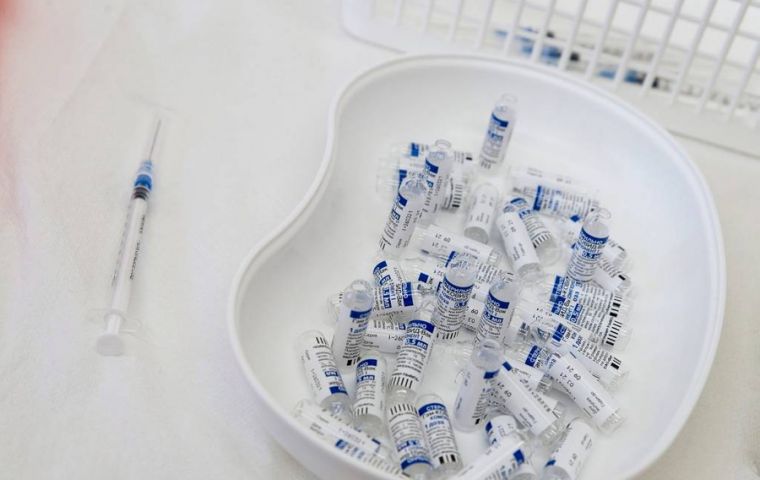MercoPress. South Atlantic News Agency
Anvisa expected to decide Monday on fate of Sputnik V vaccine in Brazil
 The Russian-made vaccine is 97.6% effective according to a study yet to be reviewed
The Russian-made vaccine is 97.6% effective according to a study yet to be reviewed Brazil's National Health Surveillance Agency (Anvisa) will evaluate this coming week the feasibility of importing the Russian-manufactured Sputnik V vaccine against covid-19.
Anvisa's board is to convene Monday at 6 pm local time. ”The date of the meeting was set due to the 30-day period defined by Law, and confirmed by the STF (Federal Supreme Tribunal), for Anvisa to evaluate requests for importing vaccines to Covid without registration,“ explained Anvisa in a note.
Anvisa experts returned to Brazil from Russia Saturday with the information necessary to make a decision. One of Anvisa's main demands for Sputnik's analysis was the lack of a ”technical report“ that supported the granting of the Registration Certificate issued by the Russian Ministry of Health. The document should detail the quality, safety and efficacy aspects of the vaccine that supported the decision of the foreign authority.
In addition to that, Anvisa also listed on March 1 that three items related to ”Good Manufacturing Practices” are not included in the documentation sent by the Brazilian pharmaceutical company União Química, which is the intermediary in the import process and which also plans to manufacture the vaccine in Brazil.
Brazil's Federal government and at least nine states have agreements to purchase millions of doses of the immunizer. In March 2021, the Ministry of Health signed a contract for 10 million doses, with 400,000 doses already scheduled for April.
The Sputnik V vaccine was 91.6% effective against the disease, according to preliminary results published in the scientific journal The Lancet. And in another study, not yet peer-reviewed, the effectiveness was 97.6% in an analysis of the situation of 3.8 million vaccinees.
Sputnik V uses viral vector technology. In this type of vaccine, another virus (in this case, the adenovirus) “takes” the genetic material of the coronavirus, the RNA, into our body. But this adenovirus is modified so that it cannot replicate (reproduce). Therefore, it does not cause disease.
In the case of Sputnik, the adenovirus that takes the coronavirus into the body is different with each dose: in the first, it is Ad26 (even from the Johnson vaccine). In the second, it is Ad5, more common. Both are human adenoviruses.
Russian scientists explain that using different adenoviruses can help create a more powerful immune response - compared to using the same vector twice - because it decreases the risk of the immune system developing resistance to the initial vector.
In January the Russian Direct Investment Fund (RDIF) and Brazilian pharmaceutical company Uniao Quimica have agreed to supply 10 mln doses of Sputnik V vaccine to Brazil. According to RDIF CEO Kirill Dmitriev, the fund and Uniao Quimica will be able to supply 150 mln doses of vaccine to Brazil in 2021.




Top Comments
Disclaimer & comment rulesCommenting for this story is now closed.
If you have a Facebook account, become a fan and comment on our Facebook Page!